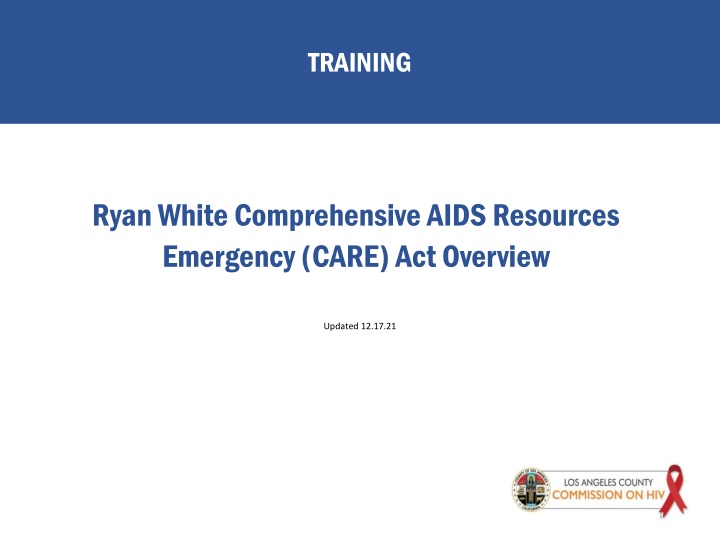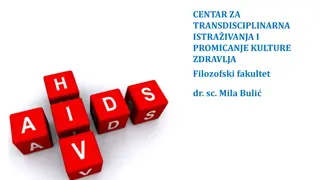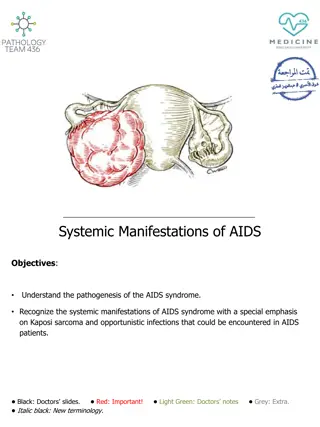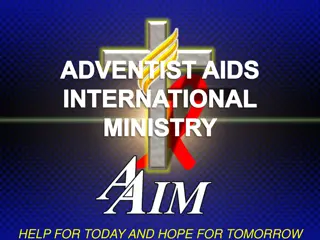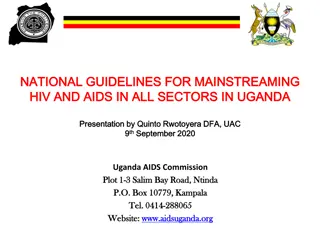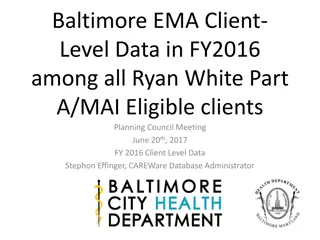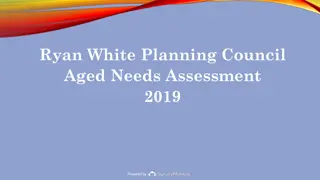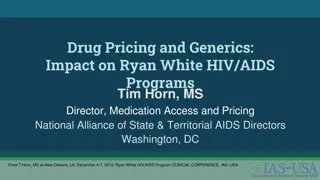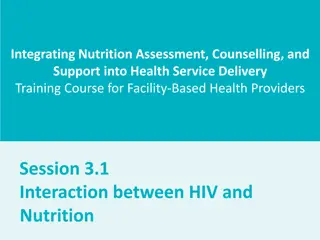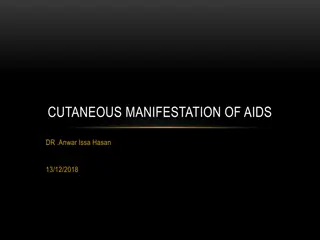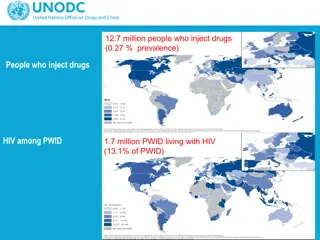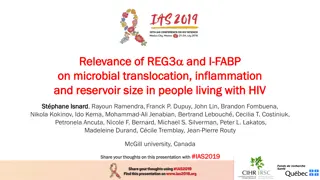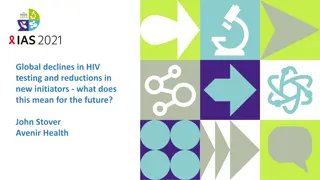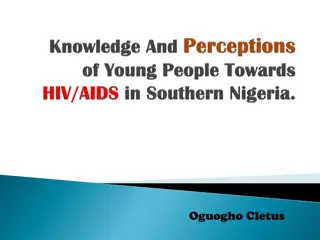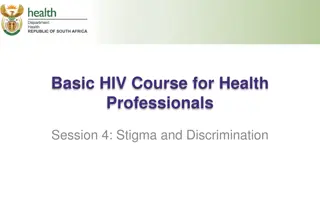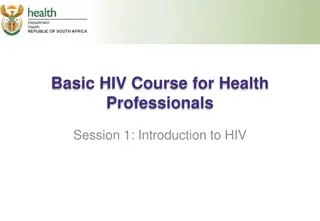Overview of Ryan White CARE Act: 30 Years of Lifesaving Care for People Living with HIV/AIDS
August 18, 2020, marked the 30th anniversary of the Ryan White CARE Act, a landmark legislation that established the Ryan White HIV/AIDS Program providing care and treatment services to individuals with HIV in the U.S. The Act has been amended several times to extend and revise its purpose, no longer being emergency relief but focusing on providing life-saving care and addressing unmet needs in primary health care and support services for those with HIV/AIDS. The Health Resources and Services Administration (HRSA) oversees and administers the Act, making it the largest Federal program dedicated to serving those living with HIV/AIDS.
Download Presentation

Please find below an Image/Link to download the presentation.
The content on the website is provided AS IS for your information and personal use only. It may not be sold, licensed, or shared on other websites without obtaining consent from the author.If you encounter any issues during the download, it is possible that the publisher has removed the file from their server.
You are allowed to download the files provided on this website for personal or commercial use, subject to the condition that they are used lawfully. All files are the property of their respective owners.
The content on the website is provided AS IS for your information and personal use only. It may not be sold, licensed, or shared on other websites without obtaining consent from the author.
E N D
Presentation Transcript
TRAINING Ryan White Comprehensive AIDS Resources Emergency (CARE) Act Overview Updated 12.17.21 1
Learning Objective Learn about the landmark law that established lifesaving care for people living with HIV in the United States. 2
August 18, 2020 marked the 30th anniversary of the Ryan White Comprehensive AIDS Resources Emergency (CARE) Act. Landmark legislation created the largest Federal program focused exclusively on providing care and treatment services to people with HIV, called the Ryan White HIV/AIDS Program. 30 Years and Counting 3
Ryan White CARE Act Brief Timeline Amended and Reauthorized Enacted 1990 1996 2000 2006 2009 Ryan White HIV/AIDS Treatment Extension Act of 2009 4
Revised Purpose of Ryan White Legislation No longer emergency relief for overburdened health care systems Now Revise and extend the program for providing life-saving care for those with HIV/AIDS Address the unmet care and treatment needs of persons living with HIV/AIDS by funding primary health care and support services that enhance access to and retention in care 5
Ryan White Treatment Extension Act Largest Federal government program specifically designed to provide services for people living with HIV/AIDS $2.39 billion in funding in FY 2020 Third largest Federal program serving people living with HIV/AIDS after Medicaid and Medicare Enacted as the Ryan White Comprehensive AIDS Resources Emergency Act in 1990 Amended in 1996, 2000, 2006, 2009 no longer an emergency act 6
The Health Resources and Services Administration (HRSA), an agency of the U.S. Department of Health and Human Services, is the primary federal agency for improving health care to people who are geographically isolated, economically or medically vulnerable. Oversees and administers the Ryan White CARE Act dollars. 7
Ryan White Programs: RWHAP Part A (Division of HIV & STD Programs) Funding for 52 eligible metropolitan areas (EMAs) and Transitional Grant Areas (TGAs) that are severely & disproportionately affected by the HIV epidemic 24 EMAs ( 2,000 cases of AIDS reported in past 5 years and 3,000 living cases) 28 TGAs (1,000-1,999 cases reported in past 5 years and 1,500 living cases) Administered by the Division of Metropolitan HIV/AIDS Programs (DMHAP), Health Resources Services Administration (HRSA) Carryovers not allowed; temporary special waiver only due to COVID 8
Ryan White Programs: Part B (State Office of AIDS) Grants to all 50 States, DC, Puerto Rico, territories and jurisdictions: Base Award Supplemental (competitive) Award AIDS Drug Assistance Program (ADAP) Supplemental ADAP Award Grants to Emerging Communities (500-999 new cases in past 5 years) Administered by the Division of State HIV/AIDS Programs (DSHAP) 9
Parts C & D and Part F Dental Services Part C: Funding to local community-based organizations, community health centers, health departments, and hospitals to support comprehensive primary health care and support services in an outpatient setting Planning grants and capacity development grants to more effectively deliver HIV care and services Part D: family-centered HIV primary medical and support services for women, infants, children, and youth living with HIV and their affected family members Part F: Special Projects of National Significance, AIDS Education Training Centers, Dental Reimbursement Programs and Community Based Dental Partnership 10
Part F Minority AIDS Initiative (MAI) Congress authorized MAI in 1999 to improve access to HIV care and health outcomes for disproportionately affected minority populations Allowable uses of MAI funds vary by Part RWHAP Part A programs receive MAI formula grants to use for core medical and related support services designed to improve access and reduce disparities in health outcomes Formula is based on the number of racial and ethnic minority individuals with HIV/AIDS in the jurisdiction Carryover allowed for 1 year only 11
Other Part F Programs Special Projects of National Significance (SPNS): supports the development of innovative models of care and effective delivery systems for HIV care, and the dissemination of successful models HIV/AIDS Education and Training Centers (AETCs): supports a network of regional centers that conduct targeted, multidisciplinary education and training programs for health care providers serving PLWH 12
Legislative Context: Facts and Factors Important to the Commission on HIV 13
Factors Affecting HIV/AIDS Services Nationally & Locally 1. Epidemic continues, especially among traditionally underserved populations but important progress in prevention. HIV health disparities persist! Because of available and emerging therapies, people with HIV/AIDS can live long and productive lives Treatment IS prevention virally suppressed PLWH rarely infect other people which means an increased focus on coordination and collaboration between prevention and care Changes in the larger health care system and financing affect HIV services Policy and funding increasingly are determined by clinical outcomes Social determinants of health, racism and stigma must be addressed in order to end HIV 2. 3. 4. 5. 6. 14
Medical Model Major focus on core medical services (medical model) 75% of funds must be spent on core medical services (waiver available) Support services must contribute to positive clinical outcomes Refinements to service categories and definitions in 2016 (HRSA Program Clarification Notice (PCN)) #16-02) 15
Core Medical Services: Parts A & B 1. AIDS Drug Assistance Program (ADAP) Treatments 2. Local AIDS Pharmaceutical Assistance Program (LPAP) 3. Early Intervention Services (EIS) 4. Health Insurance Premium and Cost Sharing Assistance for Low-Income Individuals 5. Home and Community-Based Health Services 6. Home Health Care 7. Hospice Services 8. Medical Case Management, including Treatment Adherence Services 9. Medical Nutrition Therapy 10. Mental Health Services 11. Oral Health Care 12. Outpatient/Ambulatory Health Services 13. Substance Abuse Outpatient Care 75% 16
Support Services Must be: 25% of total service expenditures Needed to achieve medical outcomes Medical outcomes = outcomes affecting the HIV- related clinical status of an individual with HIV/AIDS Commissioners need to know allowable service categories and service definitions DHSP and Commission need to be able to link funded support services to positive medical outcomes 25% 17
Support Services: Parts A & B 1. 2. 3. 4. 5. 6. 7. 8. 9. Child Care Services Emergency Financial Assistance Food Bank/Home Delivered Meals Health Education/Risk Reduction Housing Linguistic Services Medical Transportation Non-Medical Case Management Services Other Professional Services [e.g., Legal Services and Permanency Planning] Outreach Services Psychosocial Support Services Referral for Health Care and Support Services Rehabilitation Services Respite Care Substance Abuse Services (residential) 10. 11. 12. 13. 14. 15. 18
Limits on Non-Service Funding Focus: maximize funding for direct services 10% administrative cap for administrative costs, including DHSP Clinical Quality Improvement Program, and Commission operational costs 19
https://hivconnect.org/ 510 S. Vermont Ave, 14th Floor, Los Angeles, CA 90020 hivcomm@lachiv.org 213.738.2816 HIVCommissionLA @HIVCommissionLA
